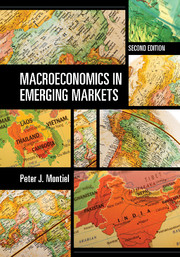Book contents
- Frontmatter
- Contents
- Preface
- PART 1 THE MACROECONOMIC FRAMEWORK
- PART 2 A BENCHMARK MACROECONOMIC MODEL
- PART 3 PUBLIC FINANCE AND MACROECONOMIC PERFORMANCE
- 9 The Intertemporal Budget Constraint of the Public Sector
- 10 Sovereign Risk Premia
- 11 Fiscal Institutions
- 12 Privatization
- 13 High Inflation and Inflation Stabilization
- PART 4 MONETARY INSTITUTIONS AND MONETARY POLICY
- PART 5 EXCHANGE RATE MANAGEMENT
- PART 6 THE FINANCIAL SECTOR AND MACROECONOMIC PERFORMANCE
- PART 7 VARIETIES OF EMERGING-MARKET CRISES
- Index
- References
11 - Fiscal Institutions
Published online by Cambridge University Press: 05 June 2012
- Frontmatter
- Contents
- Preface
- PART 1 THE MACROECONOMIC FRAMEWORK
- PART 2 A BENCHMARK MACROECONOMIC MODEL
- PART 3 PUBLIC FINANCE AND MACROECONOMIC PERFORMANCE
- 9 The Intertemporal Budget Constraint of the Public Sector
- 10 Sovereign Risk Premia
- 11 Fiscal Institutions
- 12 Privatization
- 13 High Inflation and Inflation Stabilization
- PART 4 MONETARY INSTITUTIONS AND MONETARY POLICY
- PART 5 EXCHANGE RATE MANAGEMENT
- PART 6 THE FINANCIAL SECTOR AND MACROECONOMIC PERFORMANCE
- PART 7 VARIETIES OF EMERGING-MARKET CRISES
- Index
- References
Summary
We saw in the preceding chapter that as the government's debt approaches its maximum borrowing capacity, prospective fiscal insolvency can cause the government's creditors to demand high risk premia to hold the government's bonds. Such risk premia would tend to result in high domestic interest rates, depressing aggregate demand and reducing economic activity. When the government's debt increases to the point where it is perceived as having completely exhausted its borrowing capacity, it will be unable to borrow at any interest rate. As we will see in this chapter, such a complete loss of access to credit markets by the government, because it limits the government's fiscal flexibility, has adverse economic effects that are additional to those of high interest rates. In Chapter 25, we will examine the even more destructive effects that arise when, beyond having merely exhausted its borrowing capacity, the government is perceived as having far exceeded it, triggering a sovereign (i.e., government) debt crisis. Given all these negative effects, it is easy to see why avoiding perceived risks of government insolvency – achieving fiscal credibility – would be a high priority for fiscal policy makers in emerging and developing economies.
In the preceding chapter, we began a discussion of how fiscal credibility can be achieved by considering various mechanisms for signaling the government's fiscal intentions to its creditors.
- Type
- Chapter
- Information
- Macroeconomics in Emerging Markets , pp. 261 - 283Publisher: Cambridge University PressPrint publication year: 2011



